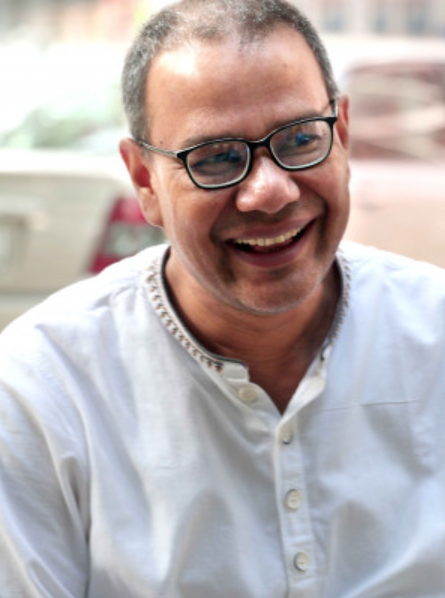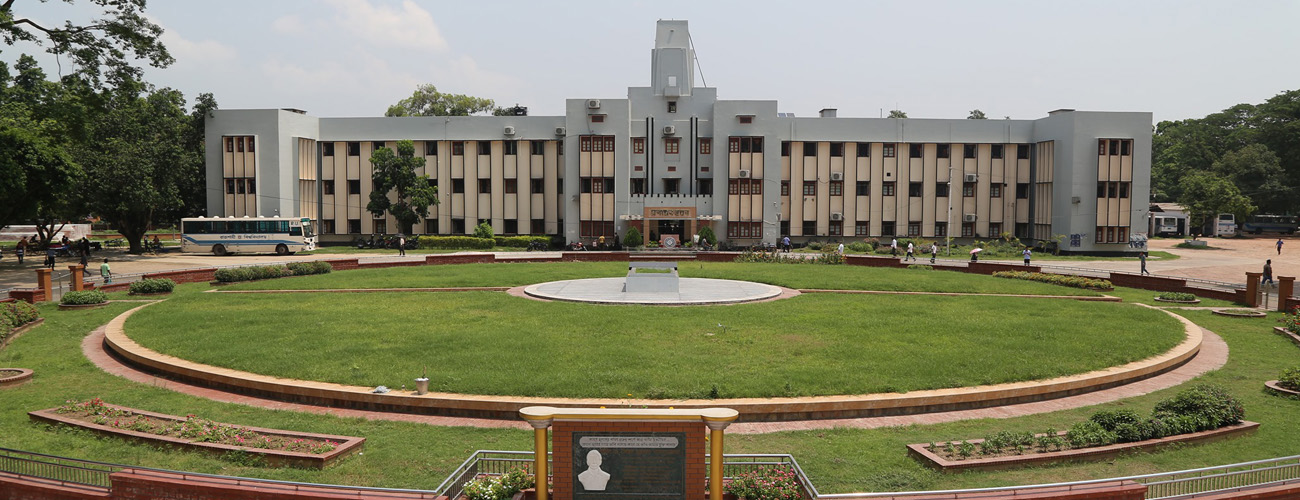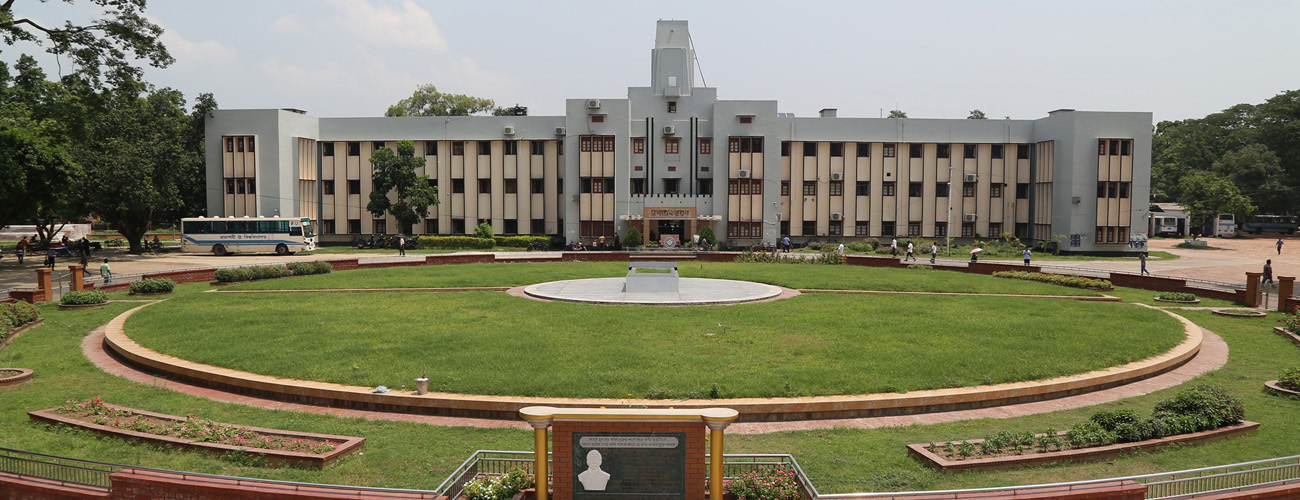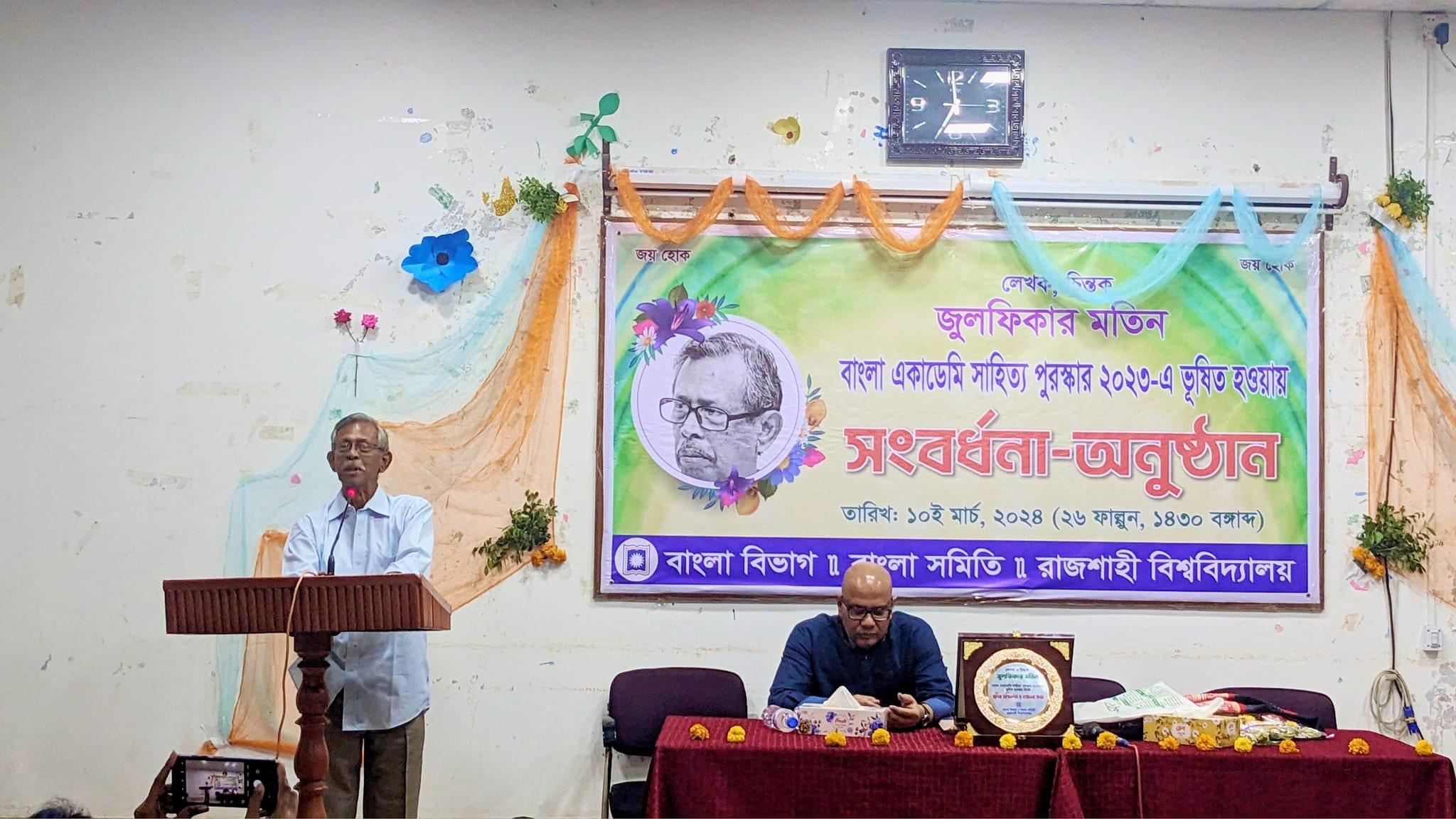Welcome to the Department of Bangla

Prof. Shahid Iqbal
Chairman
University of Rajshahi
Department of Bangla
University of Rajshahi
Overview of the University of Rajshahi
Rajshahi University is one of the largest university in Bangladesh expanding over a large area, boasting a beautiful and well decorated campus. It is located at the green premises of Motihar very close to the river, Padma and seven kilometers east of Rajshahi City.
History of the University
The university was established following the demand for a university in the northern part of the then East Pakistan (present Bangladesh) after the Liberation of Pakistan in 1947. As the demand was getting more and more pronounced, Rajshahi was selected as the site for the second university in East Pakistan. The Rajshahi University Act (East Bengal Act XV of 1953) was passed in the East Pakistan provincial assembly on March 31, 1953. Professor Itrat Hossain Zubery, the Principal of Rajshahi College was appointed as the first Vice Chancellor of Rajshahi University. After the independence of Bangladesh in 1971, a new act regarding the university, Rajshahi University Act, 1973 came into being.
Organizational Structure
The university is run according to the Rajshahi University Act, 1973. The act allows the university considerably more autonomy that most other peer institutions have. The President of Bangladesh is the ex officio Chancellor of the university but his role is mainly ceremonial. The highest incumbent after the Chancellor is the Vice Chancellor selected every four years by the senate of the university. The incumbents of the university are:
i. the Chancellor
ii. the Vice Chancellor
iii. the Pro-Vice Chancellor
iv. the Treasure
v. the Deans
vi. the Registrar
vii. the Librarian
viii. the Inspector of Colleges
ix. the Director of Students’ Counseling and Guidance (Student Advisor)
x. the Provosts
xi. the Proctor
xii. the Director (Planning and Development)
xiii. the University Engineer
2
xiv. the Deputy Registrar (Academic)
xv. the Deputy Registrar (Administration)
xvi. the Director of Accounts
xvii. The Director of Physical Education and such other officers as may be declared by the Statutes to be officers of the university.
There are five highest bodies for taking decisions and making statutes, rules and regulations for the university:
i. the Senate
ii. the Syndicate
iii. the Academic Council
iv. the Finance Committee
v. the Planning and Development Committee
The Vice-Chancellor is the whole time principal academic and executive officer of the university and the ex officio member and Chairman of the Senate, Syndicate, the Academic Council, the Selection Boards, the Committee for Advanced Studies and the planning and Development Committee. He is entitled to be present and speak at any meeting of any authority or any other body of the university.
Fifty nine departments under twelve faculties and six institutes organize all academic programmes. Around one thousand and three hundred teachers, thirty six thousand students from all over the country and abroad and two thousand and eight hundred non-academic staff are working at the university.
Mission and Objectives of the University
The mission and objective of the university is to offer the country, the nation and the world a group of intellectually advanced graduates infused with high thoughts and goals. Quality education and research are to be emphasized. The strategic mission and objectives of the university are :
i. The university will be a vibrant place where knowledge is not only practiced but searched and created.
ii. Therewill be an interdisciplinary network so that all the students of all the departments can have a fuller, comprehensive and higher vision of the whole knowledge system.
iii. The university will also have contact and joint-programmes with other universities home and abroad.
iv. TheUniversity Central Library will arrange a digital system, a network so that the students or scholars here can connect the scholars of the whole world and exchange their views and opinions on topics, sharee- books, journals or research papers.
v. It would advance research and scholarship.
3
vi. The university will train and produce high-quality knowledgeable graduates to meet national and international requirements in various sectors. Most importantly, the graduates should be good human beings, “the gentlemen” of Newman.
vii. To enhance the quality of teaching and research the university will recruit competent faculties.
viii. The universitywill give chances tothe meritorious and bright students to study here irrespective of their social or economic backgrounds.
ix. The university would offer its students scholarships,good hall facilities along with other facilities. There would be a cafeteria, a stadium, a gymnasium, a medical centre, an auditorium and many other organisations. Co and extra-curricular activities would be encouraged.
x. The teachers and students will be given social and economic security. The campus would be violence-free.
xi. The university will exercise intellectual freedom.
These are more or less the grand visions of the University of Rajshahi but we have to acknowledge that we are lagging much behind in fulfilling them. But we surely hope to realize our dream campus through continuous efforts.
Overview of the Programme offering Entity (Department of Bangla)
The Department of Bangla is the sixth oldest department of Rajshahi University established in the 1954-55 education year with a view to teaching Bangla literature and higher research.In the beginning there were only a Previous course and a Masters course available. The first Masters Exam. held in April-May 1957. Moreover, after some time, a three-year Honours course was introduced which was later (2001) replaced with a four-year Honoursprogramme. The department is a result of the concerted and sincere efforts of the literature and culture loving people of the Varendra area and a long period of dedication. The department has had the privilege to have a good many renowned scholars as its teachers. Dr. Md. Shahidullah, a great scholar of the Indian Subcontinent and Dr. Enamul Haque,a veteran intellect are two such names.
Dr. Md. Shahidullahis well-known as anearnest scholar of Bangla language and literature. He was at the same time an essayist, a researcher, a linguist, a grammarian and a progressive intellectual. He had an expertise in almost 22 different languages of the East and the West. His contribution to the knowledge field of the history and development of Bangla language is great. His literary life is also marked with a wide range of variety. The number
Dr. Muhammad Shahidullah
4
Dr. Muhammad Enamul Haq
of his published books is 86. He had served as a teacher both at Dhaka University and Rajshahi University. He was one of the founder professor of the Department of Bangla of Rajshahi University. Later, he made a dean of Arts faculty. At present one of the arts building of the university was named ÔShahidullah Kala Bhaban’ on his great academic personality.
Dr. Enamul Haque was an essayist, a researcher, a historian of Bangla literature, a linguist, and a grammarian, too. He was a lover and expert of Sufism. He has written, edited and translated a lot of books. He worked in several universities in his eventful life. He is very vital to the history of the Department of Bangla of Rajshahi University.
The department has the glorious history of its teachers’ and students’ direct or indirect participation in the liberation war of Bangladesh in 1971 and the political upheaval preceding that. It also managed to come through the shocks and blows inflicted by the war successfully. It has always been a famous department in the country.
At present the department has twenty six posts for teachers but the total number of teachers is twenty Four. There are three officers and one supporting staff (employees) and two office bearers/ attendants to assist the Chairman of the department in his administrative activities. The department has about 400 students in the Honours programme now, and about a hundred in the MA programme. Every year a hundred students are admitted in the Honours programme. It also offers M. Phil. and Ph.D. degrees. The courses and the syllabi of the department are reviewed regularly and the syllabi are updated keeping up with the development in the fields concerned. The department aims at addressing local and global needs through teaching Bangla literature. Apart from courses on Bangla literature, the department also teaches courses on other subjects to complement the study of Bangla literature including practical Bangla, sociology, world literature, literature related the independence war of Bangladesh, linguistics, criticism, aestheticism, history and so on.
The department arranges co-curricular and extra-curricular activities regularly to involve students in games and sports, and also in different cultural activities like singing, dancing, recitation, debate etc. Special cultural programmes are arranged on various occasions like the birth and death anniversaries of Rabindranath Tagore, Kazi Nazrul Islam and some other renowned writers of Bangla literature.
5
There are two essential wings of the department. One is the ÔBangla Gobeshona Sangsad’ (BGS) [Bangla Research Wing] which encourages, conducts, supervises and funds different research programmes in the field of Bangla literature.It also organizes different literary conferencesand seminars from time to time. The organization publishes the research journal of Bangla Department called Shahityiki. The other one is the “Bangla Samiti” (BS) which is an organization of the students of Bangla Department. Usually, the students arrange all the cultural functions under the banner of this organizational wing of the department. This organization publishes some little magazines at irregular intervals.
The department has produced many students who are now well established in various professions including teaching at government and non-government colleges and universities and other government and non-government institutions. These products of the department are a source of its reputation.
At present there are twenty two faculty members with specialization in different fields of Bangla literature. Among them are Professors, Associate Professor and Assistant Professors. A short description of the faculty members is given below :
Sl no.
Name
Designation
Joining Date
1.
Dr. Khandaker Forhad Hossain
Professor
14-01-1988
2.
Dr. Shafiqunnabee Samadi
Professor
18-01-1988
3.
Dr. P. M. Shafiqul Islam
Professor
01-06-1998
4.
Dr. Md. Shahid Iqbal
Professor
01-04-1998
5.
Dr. Monira Qais
Professor
01-04-1998
6.
Dr. Shameema Hamid
Professor
01-04-1998
7.
Dr. A. K. M. Masud Raza
Professor
01-04-1998
8.
Dr. Md. Mizanur Rahman Khan
Professor
01-06-1998
9.
Dr. Manikul Islam
Associate Professor
23-09-2012
10.
Dr. Mst. Shamshun nahar
Associate Professor
23-02-2013
11.
Dr. Sumaia Khanom
Associate Professor
23-09-2012
12.
Dr. Syed Taufiq Zuhori
Associate Professor
23-09-2012
13.
Dr. Purangit Mahalder
Associate Professor
23-09-2012
14.
Dr. Tania Tahmina Sarkar
Associate Professor
23-02-2013
15.
Dr. Monorama Islam
Associate Professor
23-02-2013
16
Dr. Gautam Datta
Associate Professor
23-02-2013
17.
Dr. Md. Suza Ud-dula
Associate Professor
23-02-2013
18.
Dr. Md. Delawar Hossain
Associate Professor
23-09-2012
19.
Dr. Mahamuda Akther
Associate Professor
23-02-2013
20.
Mr. S. M. Sydul Ambia
Assistant Professor
23-09-2012
21.
Mr. Goutom Goswami
Assistant Professor
23-02-2013
22.
Supriya Rani Das (study Leave)
Assistant Professor
23-02-2013
6
There is also six non-academic staff. Their description is as follows : Sl no. Name Designation Joining Date
1.
Md. Serajudula
Dupity Registrar
27-03-2000
2.
Dilip Kumar Sarker
Assistant Ragistrar
27-03-2000
3.
Somnath Majumder
Assistant Ragistrar
13-11-2024
4.
Md. Shahid Ali Sarkar
Office Support Staff
02-04-1985
5.
Md. Belal Hossain
Orderly peon
14-06-1990
6.
Azam Khan
UD (Equ.)
The department, as stated earlier, has always been a reputed one, but the syllabus and other facilities of the department have not been evaluated in the form of self-assessment or by external evaluators. To place the excellence on a sure footing, a self-assessment test is necessary.
In order to estimate the present strengths and weaknesses of the department, the self-assessment programme has undertaken to examine a number of variables that are inextricably connected to the quality of education of the department. The variables are:
1) aims and objectives of the department
2) procedures employed to attain the objectives which include:
i. condition of classroom teaching and learning or teaching methodology used
ii. study programme (syllabus and curriculum)
iii. availability of books, materials and other resources
iv. assessment and evaluation of students
v. co-curricular activities
vi. extra-curricular activities
vii. programme evaluation mechanism
viii. teacher evaluation mechanism
ix. governance/ administration
x. learning outcome of the learners
xi. marketability of the graduates
1.5 Objectives and Intended Learning Outcomes
The intended learning outcomes follow the mission and objectives of the university. It wants to produce good human beings, active and responsible citizens, academic scholar and critical thinkers.The department has four types of programmes. One is a four-year BA (Hons.) at the undergraduate level and the remaining four are a one-year MA, M. Phil and PhD programmes. The department hosts research projects funded by the University Grants Commission (UGC) and the University of Rajshahi. Skilled and experienced
7
supervisors supervise various researches undertaken by the students and fellows at the department.
The objectives of the department are :
a) to impart humanistic knowledge
b) to offer the students with critical insight into life and knowledge
c) to address local and global needs through teaching Bangla literature with relevant academic programmes
d) to promote research and knowledge of Bangla language and literature
The intended learning outcomes of the department are :
a) to produce graduates who would be first of all good human beings with the qualities of human sympathy, tolerance and love
b) to offer the country with graduates with proper theoretical and practical knowledge of Bangla language and literature and also life
1.6 Brief Description of the Programme(s) under Review
This Self-Assessment covers all the programmes of the Department of Bangla. The programmes are:
i. B.A. (Hons.) : It is a four year programme of total 3300 marks and 132 credits.
ii. M.A. : It is a one year programme of 700 marks and 28 credits.
iii. M. Phil. : The skilled and expert teachers of the department supervise many M.Phil programmes.
iv. Ph.D. : The experienced and skilled professors of the department supervise many Ph.D.researchprogrammes covering the huge area of Bangla language and literature, and also comparative literature.
1.7 Graduate Profile
There are approximately six hundred students at the department. Every year the department admits one hundred students into the BA (Hons.) through a standard competitive admission test. The department does not maintain students’ profile but their information is available in registration forms filled up by them provided by the Central Academic Section of the University.



